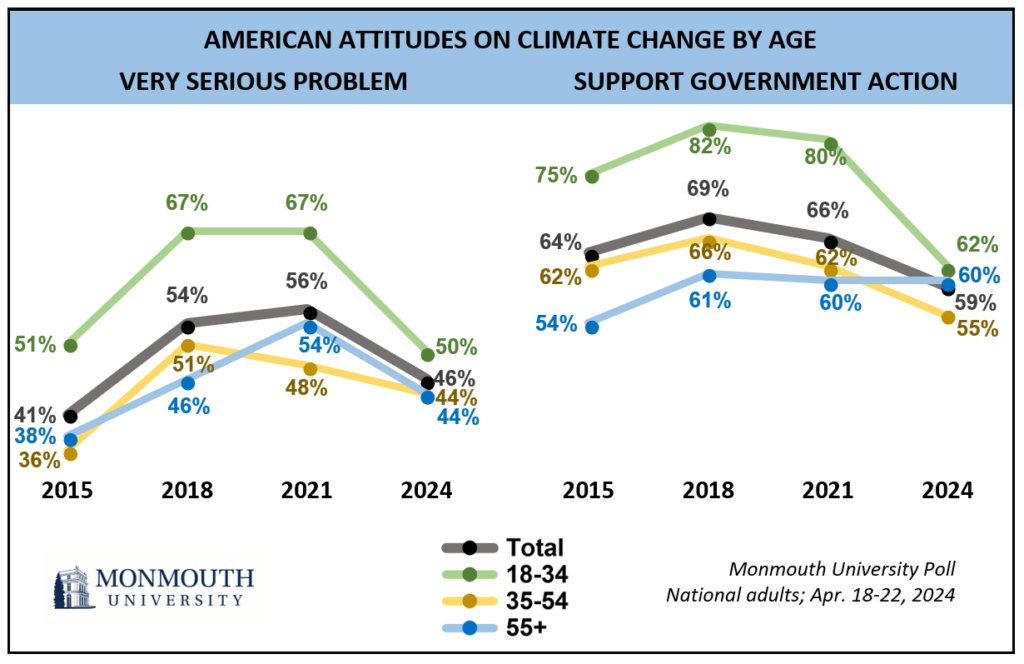By Joanne Nova
Good news: despite 2023 being the hottest year since Homo Erectus, there was a 17% fall in the number of 18 to 34-year-olds who call “Climate change” a very serious problem. Even though there were hottest-ever-headlines month after month, the punters lost the faith.
No one is cracking champagne because 50% of young adults still tell pollsters they think it is a “very serious problem”. But when all is said and done, at least half the generation that was drip-fed the dogma since kindergarten can not only see through the catastrophism but they are brave enough to tell a pollster that, too.
For the most part, after a few hot El Nino years, “climate fear” is back where it was in 2016 or so. Most people still want the government to solve the weather with someone else’s money. But where younger people were once much more enthusiastic about a Big Government fix than older people were, now that gap is almost closed. What was a 21% difference between those age groups is now only 2%. That’s a whopping fall in faith in the government to do something useful, or probably, a recognition that whatever the government does will cost too much.
Looks like young adults are learning to be cynical adults faster?
The Monmouth University group polled 804 people in late April:
Climate Change Concerns Dip: Younger adults express less urgency than in prior polls
The percentage of Americans between the ages of 18 and 34 who see climate change as a very serious problem has fallen by 17 points in the past three years (50%, down from 67% in 2021), compared with smaller declines among those who are 35 to 54 years old (44%, down from 48%) and those age 55 and older (44%, down from 54%).
But what does “a very serious problem” even mean?
Anyone can say, “It’s serious,” but only 1 in 6 people can even be bothered pretending to a pollster that climate change influences their vote:
A Monmouth poll released last month found only 15% of voters view climate change as a determinative issue in how they will vote in the 2024 presidential election, ranking far lower than inflation, immigration, and abortion.
People used to lie to pollsters and say they cared and it would affect their vote, but now most don’t even pretend. In 2019, in the UK, two-thirds of people agreed climate was the biggest issue facing humankind. The Guardian writers were sure that climate change would determine how most of the voters would vote, but the party promising to give them better weather lost in a landslide.
In 2015, when nearly half of US voters said climate was a “very serious problem”, other surveys showed only 3% ranked climate change as the most important issue.
If a twenty-something really believed the Antarctic ice cap was about to melt, wouldn’t it rate as a voting issue?
So let’s be clear, year after year, we see the same results. The voters don’t want to spend money on climate change and won’t change their vote, but the politicians act as though their career depends upon it, and the public is “demanding action”.
After years of surveys like this, we know the politicians know the voters don’t care, but they go and force climate action on the voters anyway. Who are they really working for? Their donors? The people who give them “jobs” after they leave office, or the people who employ their children now? Or are they working to appease “the media” — cowed into submission because someone might call them a denier if they don’t grovel before the Climate Demi-God?



